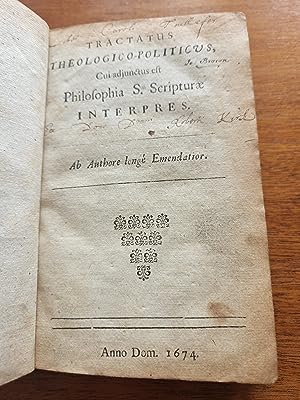Beschreibung
In Latin with occasional phrases in Hebrew. Old leather boards with new leather spine expertly restoring the whole. Original blank leaf preceding title page, [22 pages], 334, [4]; [16], 182, [19] pages, original blank leaf at end. [= original end paper, title leaf with blank verso, PRAEFATIO consisting of 9 pages, 3 pages of INDEX CAPITUM, TRACTATUS: pages 1 - 334, 2 blank leaves, PROLOGUS of 8 leaves with 8th leaf?s verso blank, PHILOSOPHIA SCRIPTURAE pages 1-182, EPILOGUS of 10 leaves with verso of 10th leaf blank, blank leaf.] The second work here, PHILOSOPHIA SCRIPTURAE, is by Spinoza'a friend and editor Ludovicus Mayer (Lodewijk Meijer), though Meijer's name does not appear and there is no separate title page for his work here. The title of this second work does appear in the title page of the Tractatus in the beginning of this book. Meijer's work here is a reprint of the 1666 Philosophia S. Scripturae, published by Rieuwertsz. It is a controversial work arguing for the philosophical interpretation of scripture. Since the Philosophia S. Scripturae Interpres often appears, without a title page and author's name, in this edition, it was once believed that this work is also by Spinoza. This third edition of Spinoza's work was published in Holland for distribution in England. The publisher's name and place do not appear, because Spinoza?s work was banned by the Hof in Holland in July 1674. 166 x 113 mm. Very old notations in ink on title page in 3 different hands: "Io: Brown"; "Liber Caroli Teullefor"; "Ese Dono Dmni Roberti Kirk" See BAR. Volume 60 page 503. & British Museum Catalogue. See, Printing and the Mind of Man 153 (1670 original edition); Bamberger T3.E (this edition). Baruch Spinoza was a Dutch philosopher of Portuguese Sephardic Jewish origin. He was one of the foremost exponents of 17th-century Rationalism and one of the early and seminal thinkers of the Enlightenment and modern biblical criticism including modern conceptions of the self and the universe. He is one of the most important philosophers of the early modern period. Inspired by the groundbreaking ideas of René Descartes, Spinoza became a leading philosophical figure of the Dutch Golden Age. He was raised in the Spanish-Portuguese-Jewish community in Amsterdam. He developed highly controversial ideas regarding the authenticity of the Hebrew Bible and the nature of the Divine. At age 23, the Jewish religious authorities issued a kherem (ban?) against him, to be shunned by Jewish society, including by his own family. Shortly after his death his books were added to the Catholic Church's Index of Forbidden Books. He was frequently called an "atheist" by contemporaries, although nowhere in his work does Spinoza argue against the existence of God. Spinoza lived an outwardly simple life as an optical lens grinder, collaborating on microscope and telescope lens designs with Constantijn and Christiaan Huygens. He turned down rewards and honors throughout his life, including prestigious teaching positions. Spinoza died at the age of 44 from a lung illness, perhaps tuberculosis or silicosis exacerbated by the inhalation of fine glass dust while grinding lenses. Bestandsnummer des Verkäufers 016128
Verkäufer kontaktieren
Diesen Artikel melden
![]()




